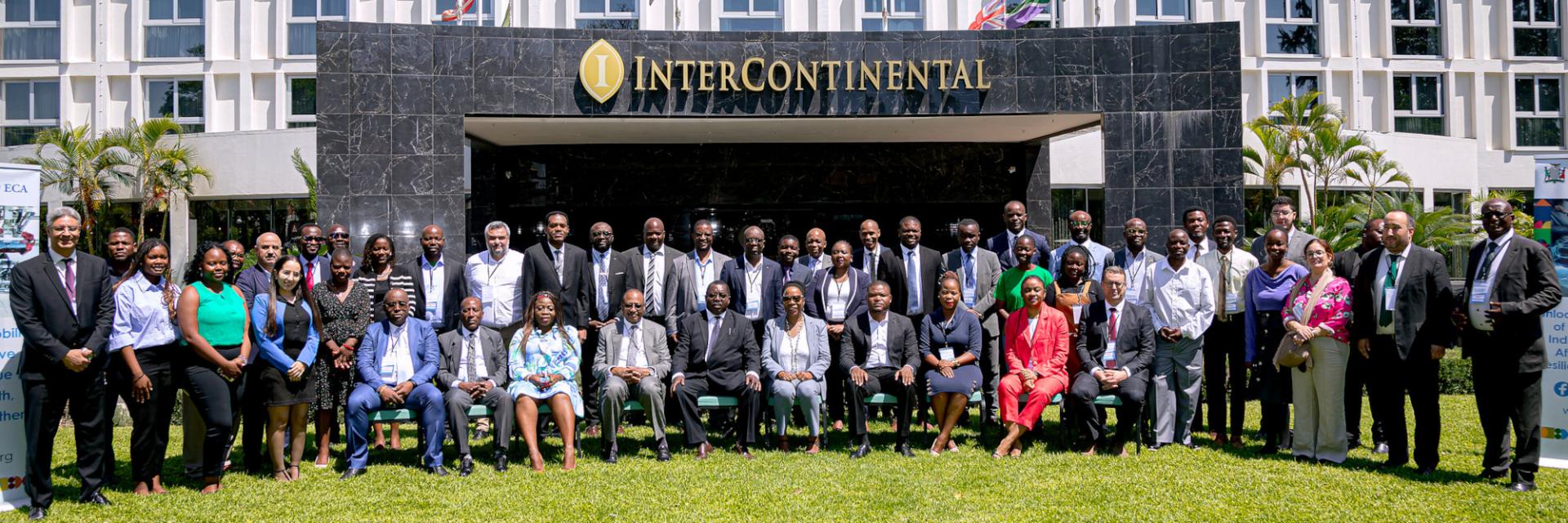Lusaka, 13 December 2024 (ECA) – Representatives from Morocco, the Democratic Republic of Congo (DRC), and Zambia at the ECA “High-Level Policy Dialogue on the Development of Automotive Regional Value Chains and E-Mobility”held in Lusaka (Zambia) on 12 December 2024 outlined a joint roadmap for the development of related value chains linking the three countries.
Senior officials and the private sector from Botswana, Lesotho, Malawi, Namibia and Zimbabwe, also participating in the policy dialogue took note of the types of automotive components (parts) that may be more readily manufactured in each country given existing capacities, enabling firms to increase penetration into automotive regional value chains.
Jointly hosted by the ECA offices for North and Southern Africa, the High-level dialogue aimed to explore strategic priorities for fostering regional value chains (RVCs) in the automotive and electric mobility (e-mobility) sectors, to evaluate partnership opportunities and refine regulatory frameworks in order to create a conducive environment for their growth.
At the conclusion of the discussions, participants emphasised the importance of integrating the project’s partnership framework into their respective national public policies and sectoral plans to ensure alignment with domestic development priorities. They recommended the signing of a memorandum of understanding in 2025 and the inclusion of Morocco into the Zambia-DRC Special Economic Zone.
ECA will support these initiatives by finalising the roadmap, implementation plan, and partnership framework for member States' approval. In addition, the UN organisation will undertake strategic studies, facilitate exchanges among stakeholders, and support capacity building for MSMEs in the automotive sector.
“Africa’s automotive industry is projected to grow by 40%, reaching $42.06 billion by 2027. Simultaneously, the global transition to electric mobility presents transformative opportunities, with the global electric vehicle (EV) market projected to reach $46 trillion by 2050,” said Adam Elhiraika, Director of the ECA Office for North Africa.
The African Continental Free Trade Area (AfCFTA) could play a crucial role in enabling Africa to seize this opportunity, Elhiraika noted. According to an upcoming study by the Economic Commission for Africa, removing tariff barriers in accordance with the agreement could significantly boost intra-African trade in intermediate goods by 2045, with projected increases of nearly 85% in the vehicles and transport equipment sector, 46% in transport services, and 28% in energy and mining.
“Positioning Africa on competitive automotive value chains requires mapping countries that can supply competitive intermediate components, and for countries to ensure adequate policy and investment provisions to enable the development of a viable automotive sector,” said Eunice Kamwendo, Director of the ECA Office for Southern Africa in a speech delivered on her behalf.
Kamwendo highlighted ongoing challenges in Southern Africa, particularly in terms of policy frameworks, harmonization and standards for the formulation of RVCs in the automotive sector. Such gaps, which hinder economies of scale, include issues such as trade Rules of Origin, sectoral incentives within special economic zones, and pooling allied production of key components.
In a speech read in his name, Zambia’s Minister of Commerce, Trade, and Industry, Chipoka Mulenga, underlined his government’s commitment: “Our government has removed all taxes on electric vehicles, except the VAT. We have also eliminated the VAT on EVs if these vehicles are manufactured locally. Additionally, our government has committed to ensuring that at least 50% of its fleet comprises electric vehicles. This policy shift is not just a financial incentive; it is a declaration of our commitment to fostering a green economy and promoting sustainable industrialization,” he said.
The High-Level Policy Dialogue took place following a three-day workshop on the development of electric mobility regional value chains DRC – Morocco – Zambia; it brought together representatives from governments, the private sector, experts, and development organisations from eight countries.
Discussions addressed challenges related to the establishment of e-mobility and automotive value chains, priorities for harmonising policies across Africa, available financing opportunities, ecosystem development for research and innovation, and public-private sector collaboration to foster sustainable industrialisation and improve SME competitiveness.
According to estimates, the demand for vehicles in Africa is expected to reach 10 million units annually by 2030, while the global EV market is projected to reach $46 trillion by 2050. With approximately 30% of the world’s reserves of cobalt, lithium, and copper—key minerals for EV batteries—Africa is strategically positioned to secure a share of this market, contributing to its sustainable development and advancing its environmental goals.
However, developing African automotive and electric mobility value chains will require coordinated efforts among member states to establish an enabling ecosystem. This includes addressing regulatory inconsistencies, developing appropriate infrastructure such as charging stations, training a skilled workforce, and raising public awareness to encourage the adoption of electric vehicles.
Notes to editors:
-
Africa’s automotive production currently accounts for about 1.3% of global output, and is primarily driven by Morocco, South Africa, and Egypt (OICA, 2024).
-
Africa’s automotive industry was valued at $30.44 billion in 2021 and projected to grow by nearly 40%, reaching $42.06 billion by 2027 (WEF). This growth is fuelled by an annual demand for 2.4 million passenger cars and 300,000 commercial vehicles.
-
Africa’s transition to e-mobility and electric vehicles aligns with the objectives of the UN Agenda 2030 for Sustainable Development and the African Union Agenda 2063, fostering the creation of green jobs and bolstering economic resilience.

